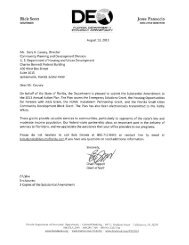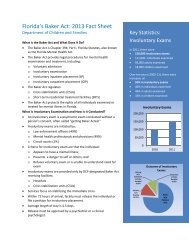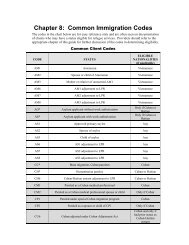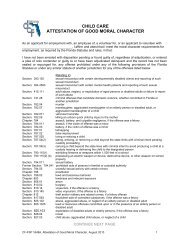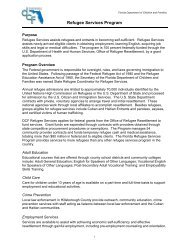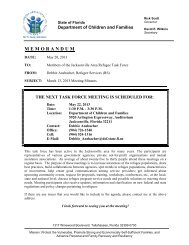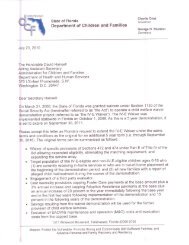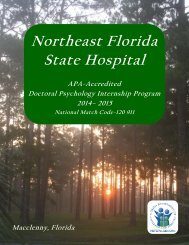Ending Abuse—Improving Lives - Florida Department of Children ...
Ending Abuse—Improving Lives - Florida Department of Children ...
Ending Abuse—Improving Lives - Florida Department of Children ...
You also want an ePaper? Increase the reach of your titles
YUMPU automatically turns print PDFs into web optimized ePapers that Google loves.
Executive SummaryEach year the <strong>Department</strong> <strong>of</strong> <strong>Children</strong> and Families, underthe guidance <strong>of</strong> Secretary Lucy Hadi, reports to the <strong>Florida</strong>Legislature on the Domestic Violence Program’s administrativeactivities related to domestic violence interventionand prevention services. Fiscal year 2005-2006 was a year<strong>of</strong> notable achievements considering <strong>Florida</strong> continued tosuffer from hurricanes, furthering thealready existing need for domesticviolence support programs and services.Secretary Hadi and the departmentacknowledge the unforeseenobstacles that have created additionalburdens on an already vulnerablepopulation <strong>of</strong> women and children,and remain strong in their commitmentto support community-basedprograms aimed at assisting victims<strong>of</strong> domestic violence.The <strong>Florida</strong> <strong>Department</strong> <strong>of</strong> LawEnforcement (FDLE) reports forcalendar year 2005 a total <strong>of</strong> 126,386domestic violence incidents. TheFDLE Uniform Crime Reports AnnualReport indicates that domesticviolence in <strong>Florida</strong> accounted for 39percent <strong>of</strong> all comparably reportedviolent <strong>of</strong>fenses and simple assault.Twenty-four percent <strong>of</strong> all domesticviolence crimes were committed bythe victim’s spouse. Based on nationalresearch conducted by Michael Johnson, PhD for theCenter for Law and Social Policy-2006, “it is estimated thatmore than two million women are victims <strong>of</strong> intimate terrorismin the US each year.” <strong>Florida</strong> is no exception to thisalarming statistic.Domestic Violence accounted for 176 (20 percent) <strong>of</strong> thestate’s 881 murders during 2005. These figures are up ahalf percent from 2004, when there were 946 homicides, <strong>of</strong>which 184 were domestic violence related. The spouse orlive-in partner was the victim in 54 percent <strong>of</strong> these <strong>of</strong>fenses.<strong>Children</strong> accounted for seven percent <strong>of</strong> the victims. Inorder to combat this serious problem, many communitiesin <strong>Florida</strong> have formed Domestic Violence Fatality ReviewTeams. In 2005, there was one new and fourteen active domesticviolence fatality review teams covering 23 counties.<strong>Florida</strong> has come to rely on the expert knowledge andinformation disseminated from the fatality review teamsreview process. The teams’ experience and quality reviewsassist policy-makers and law enforcement in their effortsto prevent future deaths.Through increased support andfunding, domestic violence centershave been able to enhance their servicesto women, children, and menand continue to <strong>of</strong>fer a wide array <strong>of</strong>additional services, including transportation,transitional housing, andlife skills training. In FY 2005-2006two domestic violence centers wereable to build new and larger sheltersand outreach <strong>of</strong>fices or to improveand upgrade their existing facilities.Of particular importance is <strong>Florida</strong>’sconcern for the elderly populationwhere abuse occurs at an alarmingrate. In FY 2005-2006, 101 individuals60 years and older were servedin emergency shelters and 1,200were served in outreach programs.Domestic violence centers continueto play a pivotal role through theirexpert knowledge, empathy, andadvocacy in procuring and <strong>of</strong>feringspecialized services for domesticviolence victims and survivors.The Domestic Violence Program Office remains committedto supporting the Governor’s personal conviction that“through heightened education and awareness, we canhelp identify victims <strong>of</strong> domestic violence and work to putan end to this crime.” During October 2005, domestic violenceawareness month, the department hosted trainingin Orlando that featured Lydia Walker, national domesticviolence advocate and child welfare expert, who presentedon the importance <strong>of</strong> child welfare workers and domesticviolence advocates working together to supportwomen and children suffering from violence in the home.Additionally, in June the department sponsored a trainingevent in Ocala designed to educate community–basedprograms wishing to establish a coordinated communityresponse to domestic violence. The presenters were fromDomestic Violence Annual Report 2005-2006



